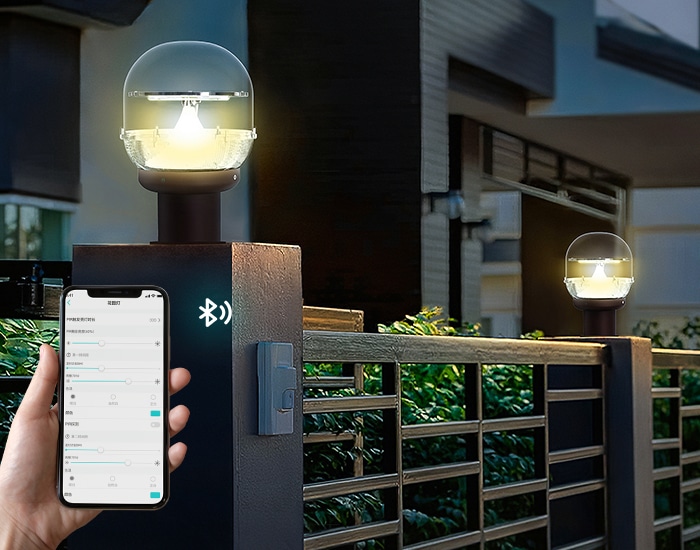Providing the right lighting in the right circumstances is vital to our well-being. Smart lighting lets you create a mood and atmosphere. Whether it is early morning, evening, or late at night, lighting may be used. Connect your smart lighting and create an atmosphere in an instant. Dim, turn off, turn on, or switch from warm to cold light using a remote control or app. It’s easy to start enjoying smart outdoor lamps.For homes and businesses, smart lighting has become a major factor in improving energy efficiency. Compared to conventional lighting systems used in homes, which consist of manual switches or dimmers, intelligent lighting systems are as simple as automating individual lighting and can therefore be controlled with a timer or remote control device.
Intelligent lighting systems
A daylight equalizer or daylight compensation system automatically adjusts the brightness of the light to provide a comfortable, energy-efficient environment. Intelligent lighting systems can detect changes in ambient light, and the unique dimming features of smart solar lights save energy by dimming the lighting.Motion sensors with smart lighting also ensure that the lights are used only when needed, thus reducing energy waste. The lighting system can detect the presence of people in the range through PIR sensing, and automatically control the brightness. For example, solar lamps are bright when someone is near them, and low when no one is around.In addition, smart lighting system allows users to easily customize the system for optimal performance by operating the lighting using a cellular phone or over the internet. It can also control the lights that are linked to a security system. Hence, intelligent lighting systems are greener, cheaper, and more flexible, which makes them the future of lighting.The meaning of smart lighting(1) Advanced controlsInefficient timers can be replaced with flexible, individual controls.(2) Energy efficiencyBy dimming unnecessary lights and diverting power away from faulty units, energy consumption can be slashed.(3) Improved maintenanceMaintenance work can be sped up through the real-time reporting of faults.(4) Financially prudentInstalling controls as part of a pre-arranged LED upgrade makes good business sense.(5) An IoT platformAdditional sensors and smart city infrastructure applications – such as smart parking, smart waste, and air sensors–can easily be added later.Lighting optimization aims to reduce the energy consumption of lighting systems by using efficient lamps to provide the right amount of light at the right time. Intelligent and weather adaptive street lamps are a good example of intelligent solar lighting systems.
Providing the right lighting in the right circumstances is vital to our well-being. Smart lighting lets you create a mood and atmosphere. Whether it is early morning, evening, or late at night, lighting may be used. Connect your smart lighting and create an atmosphere in an instant. Dim, turn off, turn on, or switch from warm to cold light using a remote control or app. It’s easy to start enjoying smart outdoor lamps.
For homes and businesses, smart lighting has become a major factor in improving energy efficiency. Compared to conventional lighting systems used in homes, which consist of manual switches or dimmers, intelligent lighting systems are as simple as automating individual lighting and can therefore be controlled with a timer or remote control device.

Intelligent lighting systems
A daylight equalizer or daylight compensation system automatically adjusts the brightness of the light to provide a comfortable, energy-efficient environment. Intelligent lighting systems can detect changes in ambient light, and the unique dimming features of smart solar lights save energy by dimming the lighting.
Motion sensors with smart lighting also ensure that the lights are used only when needed, thus reducing energy waste. The lighting system can detect the presence of people in the range through PIR sensing, and automatically control the brightness. For example, solar lamps are bright when someone is near them, and low when no one is around.
In addition, smart lighting system allows users to easily customize the system for optimal performance by operating the lighting using a cellular phone or over the internet. It can also control the lights that are linked to a security system. Hence, intelligent lighting systems are greener, cheaper, and more flexible, which makes them the future of lighting.
The meaning of smart lighting(1) Advanced controlsInefficient timers can be replaced with flexible, individual controls.
(2) Energy efficiencyBy dimming unnecessary lights and diverting power away from faulty units, energy consumption can be slashed.
(3) Improved maintenanceMaintenance work can be sped up through the real-time reporting of faults.
(4) Financially prudentInstalling controls as part of a pre-arranged LED upgrade makes good business sense.
(5) An IoT platformAdditional sensors and smart city infrastructure applications – such as smart parking, smart waste, and air sensors–can easily be added later.
Lighting optimization aims to reduce the energy consumption of lighting systems by using efficient lamps to provide the right amount of light at the right time. Intelligent and weather adaptive street lamps are a good example of intelligent solar lighting systems.
